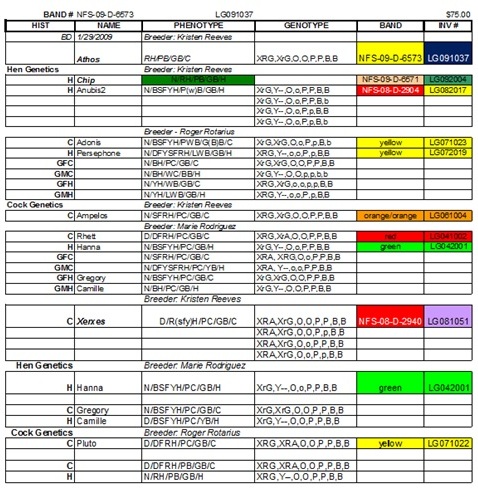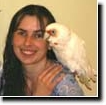BIRD PURCHASE TIPS
Kristen Reeves, Meadowlark Farms Avian Supply, Inc.
Two of the most important decisions you can make is where to purchase a bird, and the quality of the bird you select! While not foolproof, chances are if you follow the below advice, you'll get a healthy bird that will provide you many years of pleasure!
A Word About Pet Stores -
I realize there are many reputable pet stores that actually give their birds excellent care, but I cringe every time I hear one of my clients say they saw a pretty bird at a store and would like to purchase it. IF you choose to purchase your bird from a store, ask the sales person if they have a boarding room. Tell them you'd like to see it. If they allow you to, look for signs of mites. Decide if it is clean and if the birds in their care look healthy and happy. Are the cages large enough? Is there ample space for the birds to move about? Do the sales folks know their stuff? Are they knowledgeable and able to answer your questions clearly?
If they won't allow you to see the boarding room or if you think the cages are dirty or the birds don't have enough room, chances are the store isn't caring for their boarded birds, and they won't be caring for their saleable birds either! The same rules apply to pet stores as do to private sellers. If the store smells bad (like they haven't changed cages in a while), if it is cluttered and cages are dirty, DON'T DO IT!
If they don't have a boarding room, you'll have to go on what you see in the display area. Are the cages clean and free of clutter and odors? Do the birds look healthy and in good feather? Do they have ample food and water? Are they ALL bopping about as healthy birds should? Are there any fluffed birds in the cages? If so, they could be making the other birds sick...it just hasn't shown up yet!
DO YOUR RESEARCH!
Ask other bird owners about their experience with the store and ask the store owner for references BEFORE YOU BUY. I say this out of bird preservation. I cannot tell you how many times I've been suckered into purchasing a bird only to find out it had health issues.
JUST BE CAREFUL AND FOLLOW THE STEPS BELOW - REGARDLESS OF HOW MUCH YOU TRUST THE SELLER - EVEN ME!
If it doesn't feel right, it probably isn't!
If the cages are clean, there is no odor, the birds are happy and look healthy, it is probably okay to purchase them at this store.
LISTEN TO YOUR INSTINCTS!
Check Out the Digs...Private Breeders/Sellers
When purchasing a bird, ask the seller if you may see where the bird has been raised. If the aviary or bird area is clean and free of clutter and foul odors, chances are the bird will be healthy. If the seller will not allow you see the area, there may be a reason! Think twice before purchasing from this seller! Keep in mind, however, that many excellent breeders will not allow you to see their breeding room. There are good reasons for this - one never knows what a visitor may be bringing in on their shoes or clothing, and Goulds and other smaller finches & canaries are often very skittish. A breeding pair may abandon their clutch or chicks if disturbed or if someone new enters the room.
Again, in a case like this, you'll have to go by the looks of the cage in which the birds you are considering purchasing are housed and how they look - in good feather, bopping around, twittering or singing, ample food and water, etc.
It is also important to know whether the seller is willing to share information on how to care for the birds and answer any questions you may have. It's a bonus, but a good thing to look for in a seller...consider it an insurance policy on your new investment!
When I sell a bird, I literally teach the customer what to look for and SHOW THEM. I take the bird in hand, blow the feathers away from the belly so they can see and explain what to look for; color, shape, etc. I show them the nostrils and nails, pull out wings to show feather condition, and hold the bird up to the buyer’s ear for a listen. And if I forget, my customers know to remind me! I expect that from them. Repeat customers have been well trained to make sure I do what I should, and I like it that way!
If they ask me which bird “I” would purchase from the lot, I tell them and explain WHY I’d choose that bird. Not everyone is looking for “show quality”, so I explain the difference or what I “see” in every bird I sell.
My customers are given genetic information and family history complete with birth date, parentage, last molt, last Quarterly Quarantine (if applicable) and a host of other information. It is one reason I have so many repeat customers.
If either the customer or I feel uncomfortable in any way about a bird or each other, we walk away. No questions asked.
Observe closely: Observe the bird you are interested in. Only purchase birds that are actively participating in their surroundings. Do NOT purchase a bird that sits fluffed on its perch or on the bottom of the cage. Don't fall for the "sad little puppy" act. Only a sick bird will sit fluffed. If you purchase a fluffed bird, it may die very shortly or contaminate your flock. Also, a bird in poor feather may be suffering from a range of issues such as poor nutrition, mites, abnormal molt, or a host of other problems. DON'T TAKE THE CHANCE!
The bird in this photo is sick. His feather quality is good, but he is sleeping during the day with fluffed feathers and head tucked.
Take the bird in your hand: If the seller will allow it - if they won't allow it, ask them hold the bird for you. Hold it to your ear and listen carefully. You should hear only the quick beat of its heart. If you hear a clicking noise or gurgling sound, the bird may be suffering from some type of respiratory problem including but not limited to air sac mites. Also, if the seller allows you to hold the bird, give it a little squeeze...by this I mean use your fingers to feel the breast area. You should feel only a firm, well rounded chest. If you can feel the keel (breast bone) and little meat on either side of it, the bird is underweight or possibly ill. DO NOT BUY THIS BIRD!
Check the nostrils for discharge: There should be no clumped feathers around this area and no discharge; it should be clean and dry. There should be no blockages or sores in the nostrils. Blockages and sores can indicate a chronic respiratory infection (or other problems) and occasionally scaly face mites. DON'T DO IT!
This bird's nostrils & beak are perfectly clear, clean, and well-formed.
Check the beak for deformities: In cock birds (Gouldians), the beak should be a smooth ivory with a red or yellow tip. In hens of breeding age and in condition, the beak will be mostly a uniform dark grey to black. Hens who are NOT in condition will have a beak that is medium to light ivory colored like a cocks, though it may be slightly grey in color. Hen beaks will have red or yellow - or in the case of some of MY hens, a slightly black tip over the red or yellow. Intensity of color in a bird that is NOT in breeding condition may vary slightly with genetics.
The beak should be well-formed, not overly long or crossed. The top portion of the beak, or upper mandible, should match the lower mandible and not be shorter than the latter. The beak should not have any powdery or unusual looking substances on it and should close properly and completely without spaces between the upper and lower mandible. Powdery residue could be caused by mites which could be transferred to your flock. Brownish, waxy build-up can also be mites, but may also be caused by a fungal infection.
***NOTE:A small amount of "peeling" is often normal as the bird's beak grows. This is not usually reason for alarm and the bird may be purchased without worry.
Blow the feathers away from the bird's chest and abdomen:
You should see only deep pinkish to burgundy colored healthy skin. If the skin is dry and cracked or yellow, the bird may be suffering from poor nutrition. These indicators may also point to a liver or kidney problem. You should see no black or discolored areas in the abdomen below the rib cage. Obviously, the easiest way to view a bird’s abdomen is to get them wet then move the feathers aside, but that may not be convenient while you are looking at birds to purchase. Also, wetting the bird can cause "wrinkly" looking skin which is normal when the bird is wet. Therefore, when blowing the feathers aside, if you see any of the above mentioned issues, do not purchase the bird.
Check the vent:
First of all, there SHOULD be feathers! I've seen birds with absolutely NO feathers around their vent area. This can mean the bird is over-preening, or for example, can indicate mites or a chronic enteritis condition (Some canary breeders will "trim" the feathers around the vent on the hen canaries during breeding season, but this should not be the case with Gouldians).
The feathers around the area should be clean, dry and smooth. Feathers caked with feces, discolored, or wet may indicate a condition called "Wet Vent". It is an intestinal problem causing diarrhea and loose stools. It may also indicate that the bird is less than thrifty in his own preening and grooming - do NOT purchase a poorly groomed bird or one with a wet vent!
Check the nails: The nails should not be overly long or curly (unless a trait of the specific species such as some frilled canaries). If this is the case, the seller is not providing the correct perches for his/her birds or is neglecting their duty to proper care of the birds.
Long and curling nails can also indicate poor nutrition. If the nails merely need to be trimmed, ask the seller to trim them for you, or you can do it yourself once the bird is home and has acclimated itself to its new surroundings. I use nail clippers designed for human babies, but there are scissors made exclusively for cutting a bird's nails. I merely prefer to spend less money and buy my clippers at the dollar store!
If you prefer to trim them yourself, wait at least two weeks after you bring the bird home to do so. This will allow the bird to acclimate to its new surrounding and not cause it more stress than the move may have already caused.
Also, make sure the bird has all of its toes and is not missing toes or toe nails. Missing toes and/or nails can indicate a previous health issue or neglect on the part of the seller. They also cause problems when the birds breed as they are unable to grasp a perch or get a good foothold during copulation. If you intend to breed the bird, it will need ALL of its toes.
Finally: Request records for the bird you wish to purchase. A good breeder will keep detailed records about the birds in their flock and should be willing to provide you with this information upon request – even if THEY purchased the bird elsewhere! If the bird is of breeding age, request a copy of the breeding records.
Ask if the bird has received any medication recently so that if for some reason you need to treat them. You will want to quarantine your new bird and possibly run it through a process of medications to eliminate the potential for parasites. You need to know what the bird has been given so you'll know if it is too soon for another round. Internal or external parasite medications, for example, can cause liver and kidney damage if given too soon after a dose.
Remember, just because the bird received medication does not mean they were sick. Many good breeders run their birds through a bi-yearly quarantine procedure (or quarterly like in my aviary) as a preventive measure against parasites and disease! This is actually a good thing, but you need to know what the bird has received and when.

This photo shows a pedigree for a bird sold from my aviary
Purchase tips – BROKERS/IMPORTERS
Brokers are sellers who may sometimes breed their own birds, but often purchase them in bulk at a very discounted price, then sell them at a profit. I can almost always tell the brokers from the breeders at a fair or show - breeders are open and friendly and can tell you every aspect regarding the birds they are selling. Brokers are often in a big hurry to sell, know little or share little about the birds they are selling, and the cages are often less clean than that of a breeder who takes pride in their birds.
I have seen these broker folks go around bird fairs and shows, collecting up any birds left at the end of the day. In most cases, any remaining birds are far from the best quality. Sellers don't want to have to take these sale birds home so sell the remaining birds off for a MASSIVE discount. I've seen some brokers haggle down to $5 per bird or even less - perhaps $25 for an entire cage of birds - then go on to sell them at the next fair at $50-70 per bird, knowing full well they know absolutely nothing about the birds they are selling, and that often they were sick or of lesser quality.
As you can tell, I'm not a fan of brokers. I know many - and while I don't usually say anything to them unless it is obvious the birds are sickly - I hold much distain for their practices. They give good breeders a bad name. I would NEVER purchase birds from a known broker. EVER.
I've heard many horror stories of birds dying within hours of being purchased and the fights that ensue when the buyer attempts to get a replacement bird or a refund. It is VERY important when dealing with brokers that you know the terms of the sale BEFORE handing over your hard-earned cash. Get their terms in writing so you have some kind of recourse should they renig on their deal!
Importers are individuals or companies that import birds from other countries. Some of these birds will have been bred in captivity, but most are wild-caught and highly skittish.
By law, wild caught birds or those imported from other countries are kept in Quarantine Stations for a minimum 30 days. They are given a specific course of antibiotics and watched for signs of disease. That doesn't necessarily mean that once they are released from Quarantine they are healthy. It just means the inspectors didn't see any reason to pull them from the lot.
These birds are often kept in large quantities in mixed flights. They are often stressed, and may be carrying "different" diseases or parasites than what we are used to. They must be carefully and completely quarantined before being allowed to mingle with the rest of your flock. In fact, if you don't follow the 90 day rule (full quarantine and a full 90 days in the clink) for your imported birds, you probably should!
IMPORTANT: Should you opt to purchase from a broker or importer, be certain you read and understand every aspect of their terms or guarantee BEFORE you purchase.
With an importer, you will be paying not only for the bird, but for shipping and usually the shipping crate. Should the bird die in transit or soon after it arrives, will you receive a refund? In most cases, a refund does NOT include any shipping costs. You need to know if the bird will be replaced at no cost to you (including shipping) or if the seller will merely give you a "store credit" forcing you to have to pay additional shipping charges should you decide to use that credit.
KNOW THE TERMS BEFORE YOU AGREE TO THEM!!!
If you purchase from a broker, you need to know their terms as well. Many won't have a bird to replace one with because they've "collected" birds from other breeders. If they do have a bird for you, how will they get it to you? Will you have to travel to pick it up? Do they offer ANY type of guarantee? If so, can you get it in writing?
These are all important aspects of purchasing birds.
These little guys are not just cute little pets, they are an INVESTMENT! Don't lose on that investment because of an unethical seller.
Quarantine Procedures
Whether you are purchasing your first bird, own a few, or keep a large aviary with many birds, you should ALWAYS quarantine new arrivals.
Quarantine entails keeping your new bird(s) in a quiet area while they acclimate to their new surroundings and cage - preferably away from your other birds. It means keeping your new arrivals separate from the rest of your flock until you can be relatively certain they are not ill or carrying any diseases that may be spread to your other birds. It entails running your bird(s) through a routine set of medications and observation to eliminate the potential for unwanted parasites and disease.
Please see the Laraine’s Quarantine Procedures article and Kristen’s Quarterly Quarantine article for complete quarantine directions!





